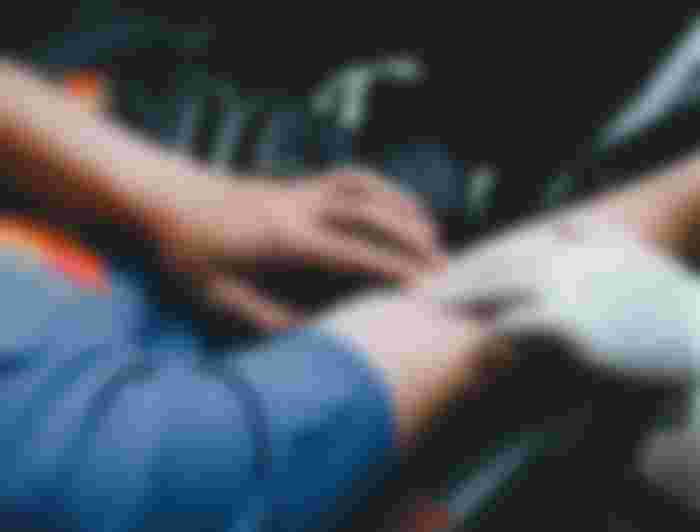Unlike some people who quickly retract their arms, faint, or even run away at the sight of needles for blood extraction, I have no problem with them. I am also fortunate to have healthy (?) veins that it doesn't take much to push the needle in and draw blood for whatever test I require.
I've seen veins collapse once the needle has been inserted so the procedure has to be done again, this time at another location, or with another vein. There have also been instances when as the blood is being extracted, the vein caves in so a new puncture has to be made.
Puncturing the same vein over and over again will render them weak over time, or even permanently disable that vein so blood can no longer flow through them.
Competence matters
While one factor in unsuccessful blood extraction is the patient's physical readiness or quality of the veins, another is the ability and competence of the phlebotomist or medical technologist tasked to draw blood or perform venipuncture.
While I am not squeamish or have no fear of needles, there have been times when I've had to wince in pain or react because the procedure was more painful than I cared for.
And that is on the one drawing blood, not because my vein was too fragile or I was nervous about what was being done. I certainly don't care for this because among other things, it will often leave a bruise on my elbow crease, which makes it very uncomfortable to move later.
Efficiency and competence
I will give kudos to the medical technologists of the National Kidney and Transplant Institute (NKTI) where I usually have my laboratory tests done. It is precisely because they are very competent and efficient that I go there when needed.
Once seated inside the extraction cubicles, they efficiently tie the rubber band around my elbow, insert the needle, and I can see my blood filling up the vial (or vials, as the case may be). Within a minute, I have a cotton ball with tape over it, my fingers pressing on it, and am out of there.
(It actually takes longer to queue for the procedure when doing it first thing in the morning because of fasting requirements. So I've learned to go through the process a day before, and just bring all my receipts the next day when I line up for the extraction itself.)

Lack of skill?
Unfortunately, the same cannot be said for nurses who are assigned to perform venipuncture for intravenous therapy. This means inserting a peripheral venous catheter, usually in the hand, to attach to an IV line.
Based on experience, only one or two in 10 nurses can ever get it right with one attempt. Most often, you notice their nervousness even before they start the insertion so it will most likely require more than one try.
My dad had his hand turn black and blue because it took three or four attempts to get that catheter inserted properly. To help relieve swelling, a warm compress will have to be applied.
More training
I can't help but wonder if local (PH) nurses in training are given enough experience performing venipuncture tasks to make them confident and competent once they actually begin doing this at work.
Practice does make perfect. And the more experience with all kinds of people and veins they have, the less anxious they will be when called upon to do it.
I remember speaking to the family pediatrician, a well-respected toxicologist as well, about this. And she related how when studying in the US, they were made to perform this over and over and over again. And it was because of such rigorous training that she became a favorite of attending physicians to do the task.
Yes, there is a special certificate course for phlebotomists in America, which I don't think is available here. And in my readings for an article I once wrote, it said hundreds of successful blood extractions were required to pass that course.
Valuable skill
While drawing blood is certainly not among the duties of ward nurses, I still think it is a valuable skill to learn and have in their arsenal to help ease the anxiety of patients.
Imagine a nurse nervous about needle insertion being asked to do it on a patient equally nervous! How many attempts will it take to get it in successfully?
My dad, who has a high tolerance for pain, suffered through such unsuccessful attempts, making him even more uncomfortable than he already was because of the medical condition he was being treated for.
Phlebotomy as I understand it, is an allied healthcare course. So, it's not like one needs to take up some medical-related course like nursing or medical technology, to become proficient at it and make a living out of it.
Of course, healthcare facilities may not see it as a necessity here in the Philippines because they often prefer staff who can do everything and not just one thing so they save on costs.
Get them ready
On the other hand, medical schools don't seem to find it necessary to give as much training for basic skills because there are medical technologists in clinical laboratories or other lower level hospitals who are not as competent at drawing blood as those in NKTI and other tertiary-level public and private hospitals.
I know that medical personnel - nurses, medtechs, and doctors - are already under extreme pressure at this time due to the pandemic. I also know that there are many more wanting to get into the profession to be of service to the people.
I just hope that they can receive the kind of training that will prepare them for the tasks ahead, even the most basic, that will make patients feel at ease while in a medical facility.
And yes, that includes venipuncture skills. The process itself can already be traumatic for some patients, so being confident about performing the procedure will be a big plus to make it less distressing or harrowing for both patient and healthcare worker.
Photos: Unsplash

Naaalala ko po dati before pandemic po, every year po akong nacoconfine kasi sobrang sakitin ko po and the worst part is sobrang nipis po ng veins ko sa kamay so may mga times po na during the duration of my admission 3 times pong naglilipat from one hand to another. 😭😭😭